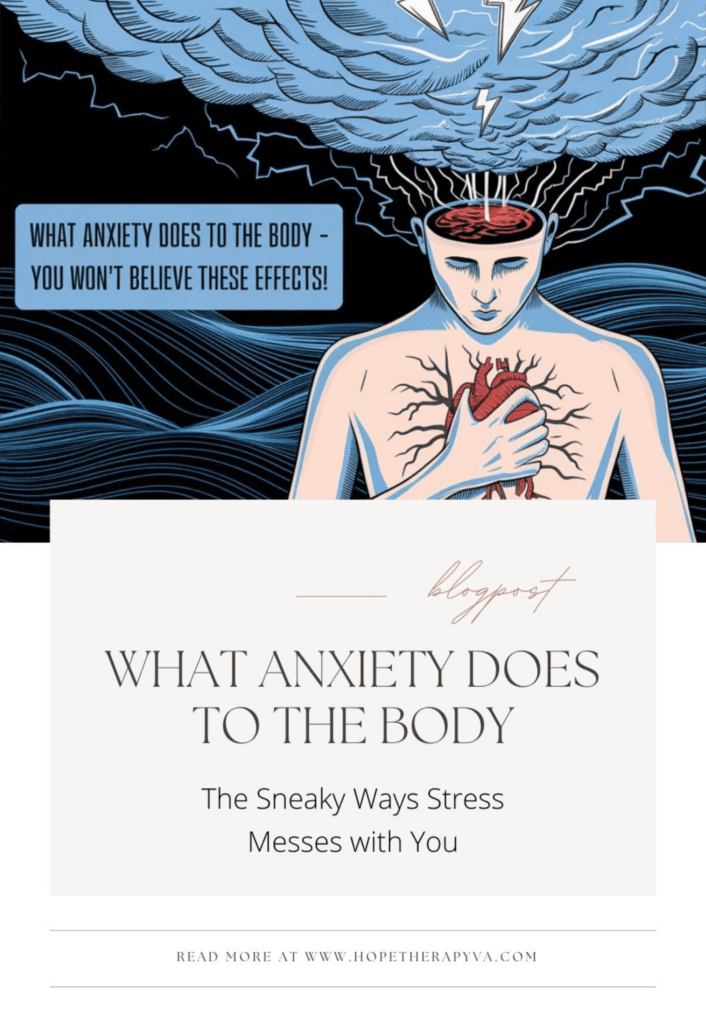Introduction
You know that jittery feeling you get before a big presentation? Or the way your stomach decides to turn into a washing machine before an important event? That’s anxiety, your body’s way of saying, “Hey, something big is happening, and I don’t know if I like it.” When you understand what anxiety does to the body, it becomes easier to recognize the warning signs and physical sensations that come with it. Anxiety doesn’t just affect your mind—it can trigger a range of bodily responses like a racing heart, shallow breathing, stomach discomfort, muscle tension, and fatigue. Being aware of these effects can help you identify when anxiety is rising and give you the chance to use coping strategies to calm your body and mind before it escalates.
For many of us, anxiety isn’t just an occasional visitor—it’s more like an unwelcome roommate who refuses to leave. Over time, it can affect nearly every system in the body, often in ways you wouldn’t expect. That’s why understanding what anxiety does to the body is so important; when you recognize its widespread effects, you’re better equipped to manage its impact and take proactive steps toward relief. And if you’re dealing with persistent physical symptoms, it’s always wise to check in with a healthcare professional to rule out other concerns and get the support you need.
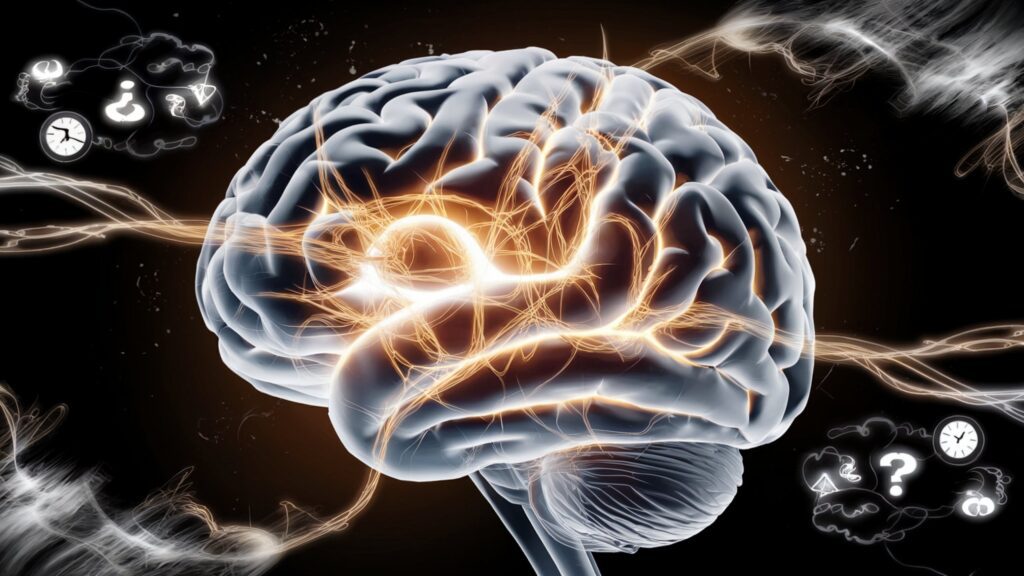
The Brain on Anxiety: A Hyperactive Alarm System
Your brain acts as the command center for the entire body, constantly processing information and deciding how we respond to the world around us. But when anxiety takes over, it’s as if someone has installed an overzealous security system that’s always on high alert. The amygdala—often called the brain’s fear center—becomes hyperactive, scanning for threats and sounding the alarm, even in situations that aren’t truly dangerous. This flood of distress signals triggers the body’s fight-or-flight response, causing physical symptoms like a racing heart, tense muscles, and rapid breathing, all in an effort to prepare you for danger that isn’t really there. Over time, this heightened state of alert can leave you feeling exhausted, overwhelmed, and stuck in a cycle of worry.
Common Effects on the Brain:
- Overthinking & Racing Thoughts: Your brain turns into a 24/7 worry factory.
- Memory Problems: Ever walk into a room and immediately forget why? Anxiety messes with your working memory, making it harder to concentrate.
- Poor Decision-Making: Anxiety forces your brain into survival mode, making even simple choices (like what to have for dinner) feel overwhelming.
Fun Fact: Your brain can’t tell the difference between a real threat (a lion chasing you) and a perceived threat (an unread email from your boss). Either way, it activates the same fight-or-flight response.
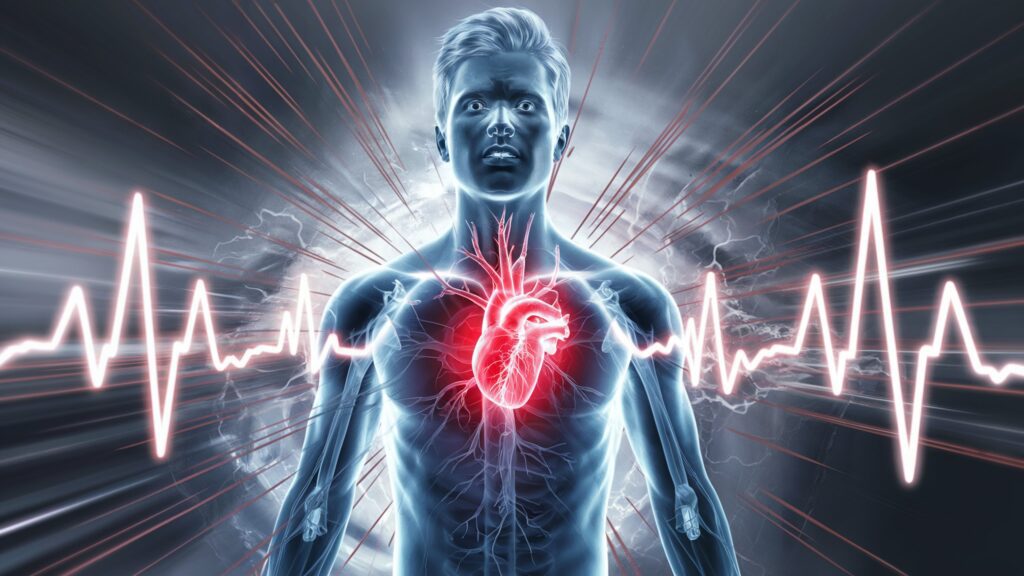
The Heart & Circulatory System: A Marathon Without the Running
Ever feel your heart pounding like a drum solo at the worst possible moment—right before a big meeting, in the middle of a conversation, or when you’re just trying to relax? That sudden, intense thumping isn’t random; it’s anxiety kicking in and triggering your body’s stress response. Your brain senses a potential threat, whether real or imagined, and signals your body to prepare for action. One of the first things it does is release adrenaline, causing your heart to race as if you’re gearing up to run from danger—even when there’s no actual danger in sight. It’s your body trying to protect you, but sometimes it just gets the timing all wrong.
Effects on the Cardiovascular System:
- Increased Heart Rate: Your body thinks it needs to run from danger, so your heart starts pumping faster.
- Higher Blood Pressure: Chronic anxiety keeps your blood pressure elevated, which isn’t great for long-term heart health.
- Increased Risk of Heart Disease: Studies suggest prolonged anxiety can contribute to heart disease over time.
When we think about what anxiety does to the body, many people focus on the mental and emotional toll but often overlook its significant impact on the cardiovascular system. Chronic anxiety keeps your heart working overtime, which can lead to palpitations, chest tightness, and even an increased risk of long-term heart issues if left unmanaged. Understanding this connection is key to recognizing how deeply anxiety can affect your physical health—not just your mind.
Pro Tip: Deep breathing exercises can counteract anxiety’s impact on the heart. Try the 4-7-8 technique—inhale for 4 seconds, hold for 7, exhale for 8. Repeat and pretend you’re a Zen master.
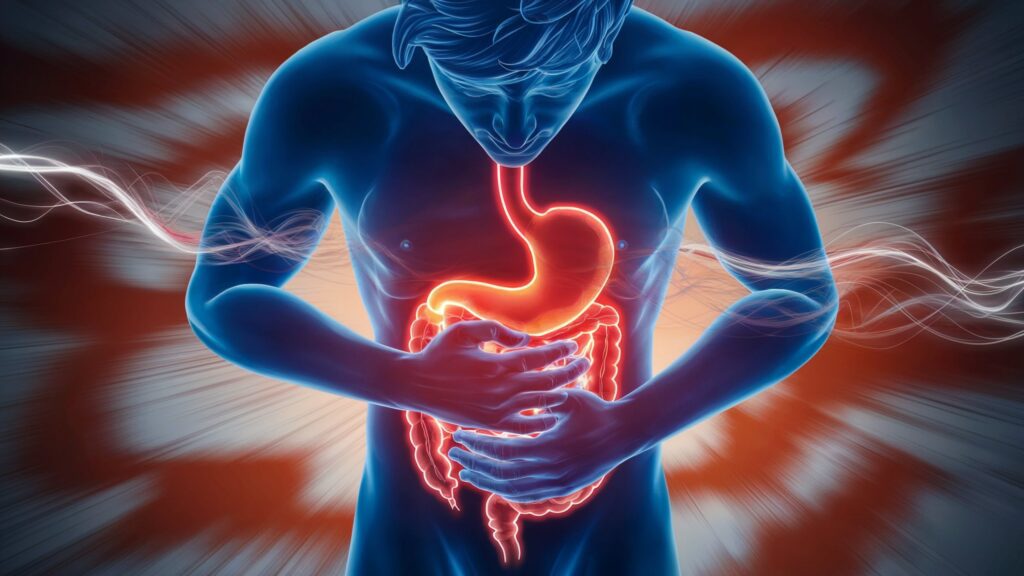
The Digestive System: Where Anxiety Loves to Wreak Havoc
Ever feel those unmistakable ‘butterflies’ fluttering in your stomach before a nerve-wracking event, like a big presentation or a difficult conversation? That’s because anxiety and digestion are what you might call best frenemies. When your brain senses stress, it shifts your body into survival mode, activating the fight-or-flight response. As a result, non-essential systems—like digestion—slow down or even come to a halt so your body can focus its energy on dealing with the perceived threat. This disruption can lead to all sorts of uncomfortable sensations in your gut: nausea, cramping, bloating, or that familiar fluttery feeling. Over time, chronic anxiety can throw your entire digestive system out of balance, leading to issues like indigestion, irritable bowel syndrome (IBS), or changes in appetite. It’s a reminder that what goes on in your mind can have a direct impact on your body—especially your gut.
Effects on Digestion:
- Nausea & Stomachaches: Your brain and gut are closely connected, which is why stress can make you feel sick.
- Irritable Bowel Syndrome (IBS): Anxiety can trigger IBS symptoms like bloating, cramps, and (ahem) frequent bathroom visits.
- Acid Reflux: Stress can increase stomach acid production, leading to heartburn.
- Loss of Appetite or Stress Eating: Some people can’t eat when anxious, while others suddenly crave an entire pizza.
The Gut-Brain Connection: Your stomach has its own “mini-brain” called the enteric nervous system, which is why emotional stress can send your digestive system into chaos.
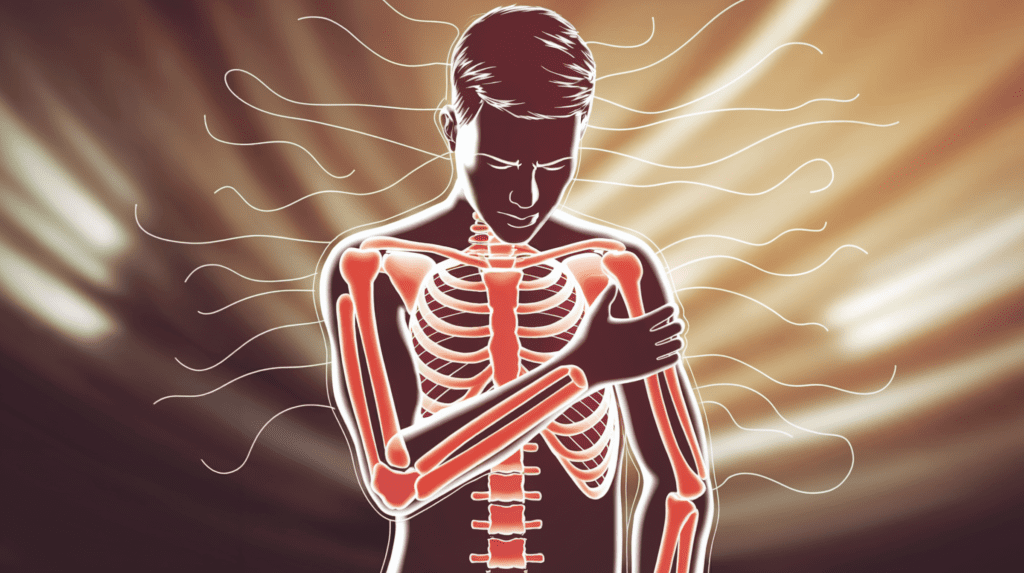
The Muscles: Tension Headquarters
Feeling stiff, sore, or like you just did an intense workout (but didn’t)? Anxiety causes chronic muscle tension, making your shoulders feel like they’re carrying the weight of the world (because, in your mind, they are). This tension isn’t limited to your shoulders—it can affect your neck, jaw, back, and even your legs, leading to headaches, body aches, and fatigue that seem to come out of nowhere. When your body stays in a constant state of alert, your muscles don’t get the chance to relax, which can eventually lead to long-term discomfort or even chronic pain. Over time, this can impact your posture, flexibility, and overall physical well-being. Practicing techniques like progressive muscle relaxation, gentle stretching, yoga, or even regular movement breaks throughout the day can help release some of that built-up tension and give your body the relief it deserves. Remember, your muscles need moments of calm just as much as your mind does.
Common Muscle-Related Issues:
- Tight Neck & Shoulders: The classic “I’ve been stressed for months” posture.
- Jaw Clenching & Teeth Grinding: Bruxism (teeth grinding) is a common anxiety symptom that can lead to headaches and jaw pain.
- Back Pain & Body Aches: Chronic stress can make you feel like you’ve aged 20 years overnight.
Relaxation Hack: Progressive muscle relaxation (tensing and releasing each muscle group) can help your body reset and ease tension.
The Immune System: When Stress Weakens Your Defenses
When examining what anxiety does to the body, the immune system’s response cannot be ignored. If you find yourself catching every cold that comes around, anxiety may be to blame. Chronic stress suppresses your immune system, making you more vulnerable to illness. When your body is stuck in a prolonged state of fight-or-flight, it prioritizes immediate survival over long-term health, diverting energy away from functions like immune defense. This means fewer resources are available to fight off viruses and bacteria, and your body’s ability to heal wounds or recover from illness slows down. Inflammation also tends to increase, which can contribute to flare-ups of chronic conditions such as autoimmune diseases, allergies, and skin issues like eczema or psoriasis. Over time, an overworked and weakened immune system leaves you feeling run down, worn out, and more susceptible to infections. That’s why supporting your immune health is crucial when managing anxiety. Regular exercise, nutritious foods, quality sleep, hydration, and stress-reduction techniques like mindfulness or deep breathing can all play a role in strengthening your defenses. And remember, if you’re frequently ill or struggling to recover, it’s a good idea to consult with a healthcare professional to rule out other underlying issues.
How Anxiety Impacts Immunity:
- Slower Healing: Wounds take longer to heal when you’re stressed.
- More Frequent Illness: Anxiety weakens your body’s natural defenses against viruses and bacteria.
- Chronic Inflammation: Long-term stress can lead to chronic inflammation, which is linked to numerous health issues like autoimmune diseases.
Boost Your Defenses: Exercise, sleep, and a balanced diet can help counteract anxiety’s immune-suppressing effects.
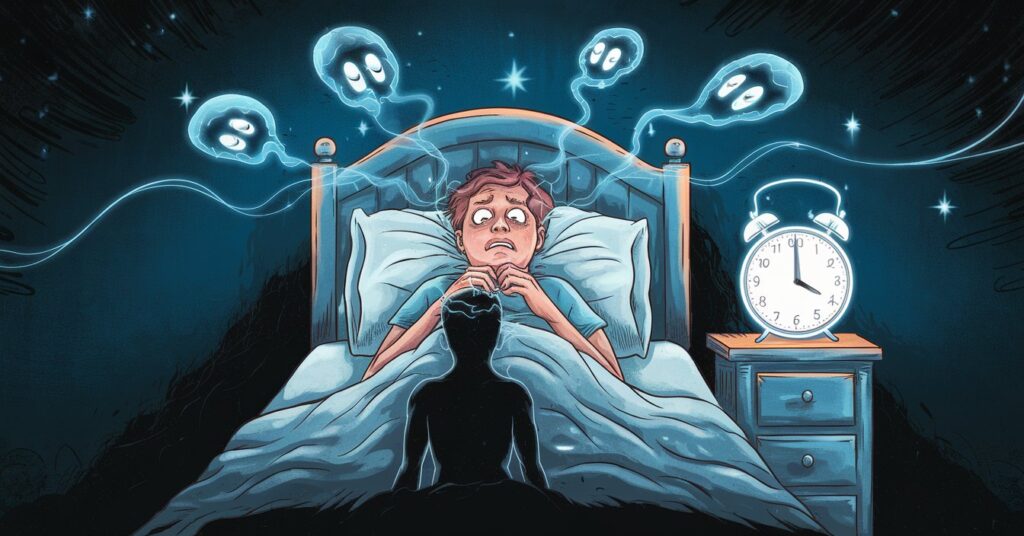
Sleep & Fatigue: The Endless Tug-of-War
Anxiety and sleep have a toxic relationship—one makes the other worse, and the cycle repeats. When you’re feeling anxious, your mind races with endless worries, to-do lists, and worst-case scenarios, making it hard to fall asleep or stay asleep through the night. Even if you do manage to get some rest, the quality of your sleep is often poor, leaving you feeling exhausted and drained the next day. And unfortunately, sleep deprivation doesn’t just make you tired—it also heightens your sensitivity to stress and makes anxious thoughts even harder to manage. Lack of sleep can increase irritability, worsen concentration, and make everyday challenges feel overwhelming, feeding directly back into your anxiety. Over time, this vicious cycle can take a serious toll on your mental and physical health, impacting your mood, immune system, and overall sense of well-being.
How Anxiety Disrupts Sleep:
- Racing Thoughts Keep You Awake: The moment your head hits the pillow, your brain remembers everything you forgot to worry about earlier.
- Frequent Wake-Ups: Anxiety can jolt you awake in the middle of the night.
- Morning Fatigue: Even if you sleep, anxiety-fueled rest is rarely restorative.
Fix It: Create a calming bedtime routine—limit screen time, try lavender essential oil, and practice deep breathing.
The Skin: Breakouts & Other Annoyances
Think stress only affects your mind? Think again. Anxiety can manifest on your skin in frustrating ways. When your body is under chronic stress, it releases stress hormones like cortisol and adrenaline, which can throw your skin’s natural balance completely out of sync. Elevated cortisol levels can increase oil production in your skin, leading to clogged pores, breakouts, and acne flare-ups—even if your skin isn’t normally prone to them. For some, anxiety can also trigger or worsen inflammatory skin conditions such as eczema, psoriasis, and rosacea, causing redness, itching, and discomfort that can be difficult to manage. You might also notice your skin becoming more sensitive or reactive, breaking out in hives or rashes during particularly stressful times. And then there’s excessive sweating—your body’s fight-or-flight response can cause your sweat glands to go into overdrive, leaving you feeling clammy or self-conscious even in cool environments.
Common Anxiety-Related Skin Issues:
- Acne Breakouts: Stress hormones increase oil production, leading to breakouts.
- Eczema & Psoriasis Flare-Ups: Anxiety can trigger or worsen skin conditions.
- Excessive Sweating: Your body’s fight-or-flight response doesn’t care that you’re in a job interview—it’s going to make you sweat anyway.
Skin Tip: Stay hydrated, practice stress management, and avoid picking at your skin (easier said than done, we know).
Conclusion: Managing Anxiety Before It Manages You
By now, you probably realize that anxiety doesn’t just live in your mind—it affects your entire body. From your brain to digestion to your immune system, understanding what anxiety does to the body is crucial in managing it effectively. Chronic stress takes a toll, but the good news is that there are effective ways to combat it.
Practical Ways to Manage Anxiety:
✔ Exercise regularly – Even a 10-minute walk helps.
✔ Prioritize sleep – A well-rested brain handles stress better.
✔ Practice mindfulness – Meditation and deep breathing work wonders.
✔ Limit caffeine & sugar – They can worsen anxiety symptoms.
✔ Seek support – Therapy, coaching, or even talking to a friend can make a difference.
Remember, anxiety might be a part of life, but it doesn’t have to control yours. Recognizing what anxiety does to the body is the first step toward developing practical strategies to alleviate its impact. Take small steps to manage stress, and your body will thank you. Now go take a deep breath—you deserve it!
